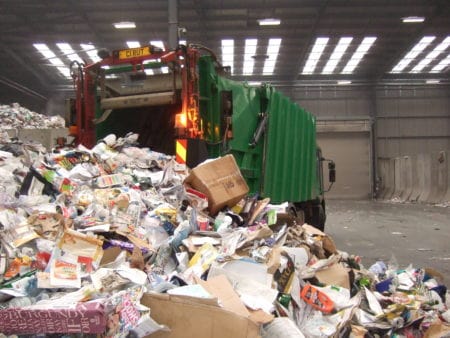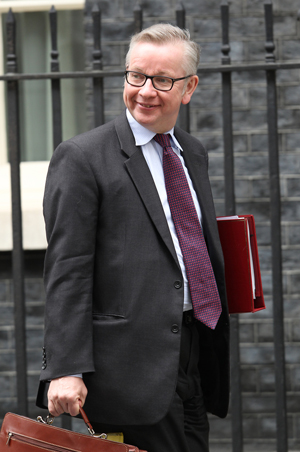Environment Secretary Michael Gove today (18 December) clarified how an Extended Producer Responsibility system for waste packaging could feed cash back to councils to spend on improved recycling services.
Money raised from an extended producer responsibility system will be used to boost household recycling through ‘improvements in recycling collections’, Mr Gove explained in a written statement to Parliament, following the earlier launch of his Resources and Waste Strategy (see letsrecycle.com story).

Funding from the recycling of packaging will be used to fund council collection services
Within the Strategy, the government has identified reform of the packaging waste system and harmonised collections of recyclable materials by councils, including weekly food waste collections, as two key areas for action.
On packaging, the Strategy suggests that government will set out its plans for an Extended Producer Responsibility system in the New Year, which would see producers pay more and also face ‘modulated fees’ for the recycling of their products, based upon the design and recyclability of goods they sell. (At present, packaging producers fund only around 10% of the overall cost of recycling and disposal of products.)
Collections
Coupled with this, the strategy also sets out an expectation for councils to move towards a more harmonised system of recycling collections, based upon agreeing a ‘consistent’ set of dry recyclable materials to be collected from the kerbside, and a weekly separate food waste service for all households.
In his statement, Mr Gove said: “Businesses and manufacturers have a key role to play. Our reforms will make certain that both the responsibility for and the cost of recycling or disposal of post-consumer packaging sits fairly and squarely with producers and not tax payers.
“The money raised will be used to boost household recycling and make sure that any packaging used is recycled and disposed of properly. This will complement a tax on plastic packaging with less than 30% recycled plastic, announced in the Budget, which will stimulate demand for recycled plastic.
“These reforms, and others, will be complemented by improvements to local-authority collections systems. Householders want to recycle more, but materials collected for recycling vary from council to council and people are confused.
“This Strategy will tackle this and we will consult shortly on legislating to allow government to specify a core set of materials to be collected by all local authorities and waste operators at the kerbside, and supporting comprehensive and frequent rubbish and recycling collections.”
Funding
Councils have already expressed concerns over the streams of funding likely to be available to implement measures such as separate weekly food waste collections – with councils already experiencing severe budget pressures for services (see letsrecycle.com story).

Environment Secretary Michael Gove
letsrecycle.com understands that further detail on the likely funding available to councils will emerge in the consultation on the producer responsibility reforms in the New Year, which will also detail how producers are expected to meet the full cost recovery of their products.
It is thought that under a new system, council funding from extended producer responsibility would be linked to the local authority’s performance in improving recycling rates, and delivering the ‘consistent’ service trailed in the strategy.
Similar to the ‘modulated’ fees paid by packaging producers – which would see the producers of more complex, less recyclable products paying a higher fee – councils which are deemed to be delivering an inconsistent service would receive less money.
LARAC
Lee Marshall, chief executive of the Local Authority Recycling Advisory Committee (LARAC) has claimed that the issue of funding is likely to be key in the delivery of the aims of the strategy.
In a statement published earlier today, Mr Marshall said: “Defra have hinted that they want to be quite prescriptive in how local authority waste operations are carried out in the future. If the funding is not forthcoming to support this then their ambitions will not get off the ground and local authorities will be left deciding which services, be that libraries, day or leisure centres they will have to reduce to pay to meet these targets.
“After years of austerity cuts and under-investment it could be the step change that is needed to build on the tremendous efforts and advances that local authorities have made in increasing recycling rates over the past 15 years.”
The post ‘Modulated’ EPR fees to pay for better council collections appeared first on letsrecycle.com.
Source: letsrecycle.com Packaging


